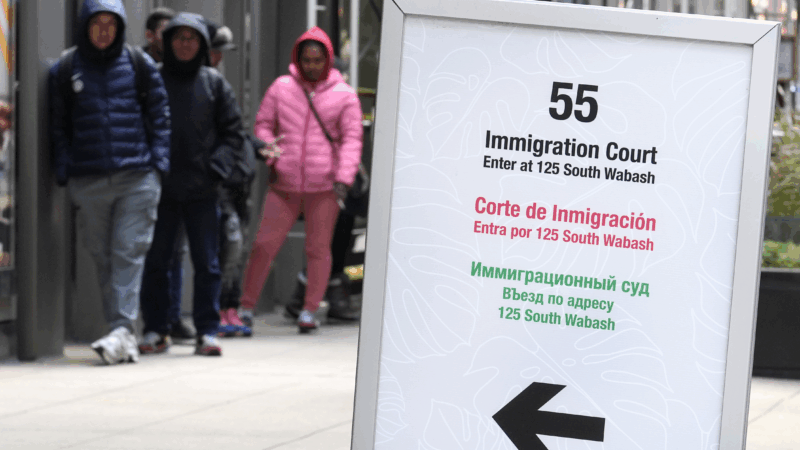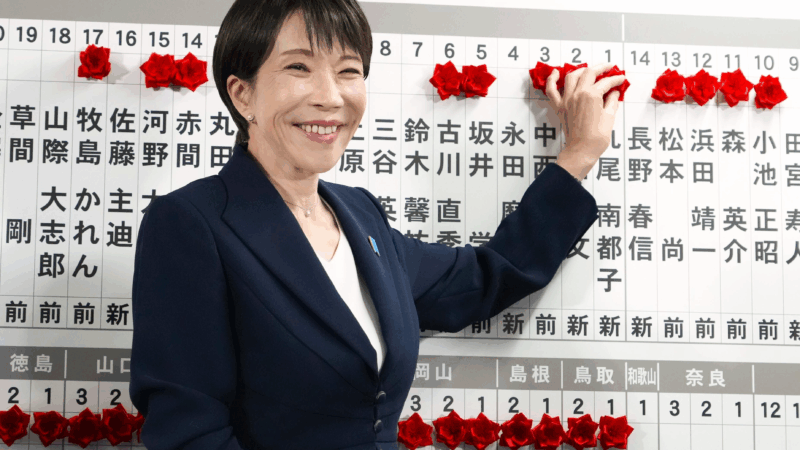Gen Z-led anti-corruption protests in Nepal put its first female prime minister in power
Transcript:
AYESHA RASCOE, HOST:
Nepal is facing its most serious upheaval in years. In less than 48 hours last week, anti-corruption protests toppled the government. Demonstrators torched buildings, looted banks and shops and attacked politicians in their homes. Now the Himalayan nation has a new leader – Sushila Karki. She was Nepal’s first female chief justice and is now its first female prime minister.
NPR’s Omkar Khandekar reports from Kathmandu, where Gen Z protesters turned to a different generation to lead their revolution. And a warning to listeners – you will hear gunshots in this piece.
(SOUNDBITE OF TRAFFIC)
OMKAR KHANDEKAR, BYLINE: Kathmandu’s parliament, a sprawling white building with pagoda roofs, is now blackened with soot and graffiti. One scrawl reads, you picked the wrong fight. It’s signed, Gen Z. Nepal’s capital spent most of the week under curfew. Yet each day, young people still found their way here, snapping selfies and flashing victory signs. Twenty-three-year-old Amarendra Shah says he doesn’t support such vandalism but understands the frustration. A trained computer engineer, he still can’t find a job.
AMARENDRA SHAH: (Non-English language spoken).
KHANDEKAR: “If Nepal was developed,” he says, “this wouldn’t have happened.”
(CROSSTALK)
UNIDENTIFIED PROTESTER: (Shouting in non-English language)
KHANDEKAR: Such anger surfaced on Monday, when thousands of Gen Z youth gathered in front of the parliament to protest against state corruption and Prime Minister Khadga Prasad Oli’s sweeping ban on social media. The police crackdown was brutal.
KHANDEKAR: Dozens died from gunshot wounds. More than a thousand were injured. By Tuesday, riots erupted.
(SOUNDBITE OF WHISTLING)
KHANDEKAR: Government buildings were torched. People clashed with the police. Firearms were stolen. As the chaos spread across the country, tens of thousands of prisoners broke out of jails. One protester, MB Lama (ph), says in the days leading up to the demonstration, videos of politicians’ children living in luxury went viral on TikTok. He calls them nepo kids.
MB LAMA: (Non-English language spoken).
KHANDEKAR: Lama says that image couldn’t be further from the reality most young Nepalis face, where even university graduates often have to leave the country to work as porters or construction laborers. Nepal has seen 16 different governments since its parliament abolished monarchy in 2007, but the top office has mostly rotated between the same set of leaders. The Gen Z protest, says Lama, was a shock to this old guard. The violence calmed down after Prime Minister Oli resigned on Tuesday evening. The army stepped in. Order was restored.
(SOUNDBITE OF WHISTLES BLOWING)
KHANDEKAR: Protesters outdoors turned to squabbling indoors. Some Gen Z groups took online polls for an interim chief on the Discord chat portal. Twenty-one-year-old student Sonu Mahaseth says one name stood out – Sushila Karki, a former chief justice known for challenging political elites.
SONU MAHASETH: She has taken a lot of, like, action against every political party’s members also in the court many times.
(CHEERING)
KHANDEKAR: When Sushila Karki took an oath as Nepal’s interim chief on Friday night, supporters in Kathmandu came out on the streets to cheer her.
UNIDENTIFIED PERSON: (Singing in non-English language).
KHANDEKAR: A young man in a black tank top belted out a patriotic song outside the ceremony home.
UNIDENTIFIED PERSON: (Singing in non-English language).
KHANDEKAR: But not everybody was celebrating. That same evening, Kaili Bohara cremated her son Subash by the Bagmati River. He had planned to study in Japan. She had worked in India as a house help to fund his future. When police opened fire on protesters at the parliament, Subash was shot in his chest.
KAILI BOHARA: (Non-English language spoken).
KHANDEKAR: Bohara says she doesn’t know what will happen in the country next. But she says if the situation doesn’t change, his sacrifice would be meaningless.
Omkar Khandekar, NPR News, Kathmandu.
Nancy Guthrie search enters its second week as a purported deadline looms
"This is very valuable to us, and we will pay," Savannah Guthrie said in a new video message, seeking to communicate with people who say they're holding her mother.
Immigration courts fast-track hearings for Somali asylum claims
Their lawyers fear the notices are merely the first step toward the removal without due process of Somali asylum applicants in the country.
Ilia Malinin’s Olympic backflip made history. But he’s not the first to do it
U.S. figure skating phenom Ilia Malinin did a backflip in his Olympic debut, and another the next day. The controversial move was banned from competition for decades until 2024.
‘Dizzy’ author recounts a decade of being marooned by chronic illness
Rachel Weaver worked for the Forest Service in Alaska where she scaled towering trees to study nature. But in 2006, she woke up and felt like she was being spun in a hurricane. Her memoir is Dizzy.
Bad Bunny makes Puerto Rico the home team in a vivid Super Bowl halftime show
The star filled his set with hits and familiar images from home, but also expanded his lens to make an argument about the place of Puerto Rico within a larger American context.
Japan’s Takaichi to pursue conservative agenda after election landslide
Japan's first female Prime Minister, Sanae Takaichi, brought the ruling Liberal Democratic Party its biggest-ever electoral victory, fueling her ambitions to pursue to a political agenda which she says could "split public opinion."






